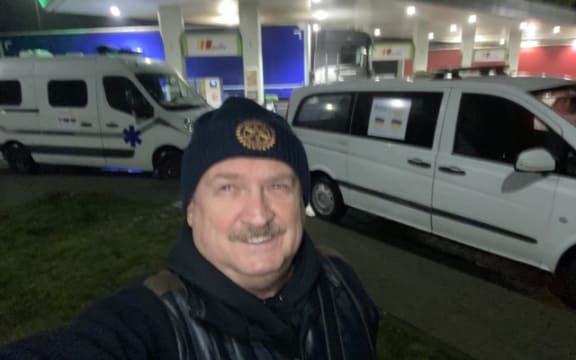
Hamilton man Yuriy Gladun inspects one of the modular homes funded by Rotary New Zealand. Photo: Supplied
A Ukrainian community advocate is urging the government to give people who have fled the conflict more support and certainty about their future in this country.
Mahi For Ukraine founder Kate Turska said her parents, Olha and Andrii, and others who came to New Zealand a year ago are still in limbo, with no word yet on what will happen when their special visas expire in 12 months.
"The majority of them don't have a home to go back to. Irrespective of the outcome of the war, it will still be years before they are able to return because the rebuilding will take some time.
"It's said de-mining Ukraine will take at least five years. So, it's quite hard for them to sit and wait and wonder if they're going to be sent back."
The Special Ukraine Visa, which opened for applications in March, is granted only to direct family members (parents, grandparents, siblings and adult children) of Ukrainians in New Zealand, who have to undertake to support them financially.
Mahi For Ukraine and other humanitarian organisations are meeting with officials next week to discuss their request for the Government to look at amending some of the criteria around the Special Ukraine Visa.
They want Cabinet to widen eligibility, remove the financial burden from sponsors, extend the time-frame and offer a pathway to residency.

Senior Ukraine Rotarian Volodymyr Bondarenko with an ambulance part-funded by Rotary New Zealand World Community Service to replace one of the many destroyed in fighting. Photo: Supplied/Yuriy Gladun
Ordinary New Zealanders were also playing a role in welcoming the newcomers, Turska said.
Mahi For Ukraine recently ran a Christmas event for families, with gifts donated by the New Zealand public.
"We wanted to create some sense of normalcy for them. Many of these people coming are elderly, they don't speak the language, they don't know anyone outside their families."
New Zealanders' efforts are also helping Ukrainians still living under the constant threat of war.
Hamilton man Yuriy Gladun, who just returned from a month in his homeland, said it was difficult to see the destruction first hand - but heartening to see life goes on.
"I felt for the people who suffer but their spirit is incredible. The country lives and fights.
"Nearly everybody in Ukraine does some kind of voluntary work. Everyone is involved in helping [others] to survive."
Gladun spent time with his sister, her daughter and young grandson in Ivano-Frankivsk in western Ukraine.
At the start of the invasion, they took two other families into their home because it had a cellar to use as a bomb shelter.
After briefly evacuating to Poland, they have since returned to Ukraine, while the war rages on in the east of the country and their city fills up with refugees.
"They are all used to the war now. I was in the centre of the city when the siren went off - no one showed any reaction at all!"
Gladun, who is also chair of the Ukrainians Association of New Zealand Northern regions, has been helping co-ordinate donations to Ukraine from Rotary New Zealand and was able to see some of its work in action.
He visited the village of Moshchun, north of Kyiv, where Rotary Ukraine is building 300 modular homes, with donations from members in New Zealand and other countries.
He also saw an ambulance, which was jointly funded by New Zealand Rotary.
"I'm extremely proud of how New Zealanders have responded.
"Ukrainans understand perfectly that without the help of the world, we couldn't survive. We couldn't sustain this war, economically or with human resources.
"Any help is hugely appreciated."
The families of the two volunteer aid workers missing near the front lines should be very proud of their work too, he said.
The fates of missing New Zealander Andrew Bagshaw and his British colleague Christopher Parry remain unknown, though a Russian paramilitary group claims to have found their passports on a body.
"For many people, the war is far away and means nothing to them. But for these two great men and their families, this is their war too.
"There is so much love and respect and appreciation towards those who are putting the lives on the line for freedom.
"We are part of the free world, if one part fails, the other part is weaker. Don't don't get fooled: New Zealand is not so far away to be outside of that process."

